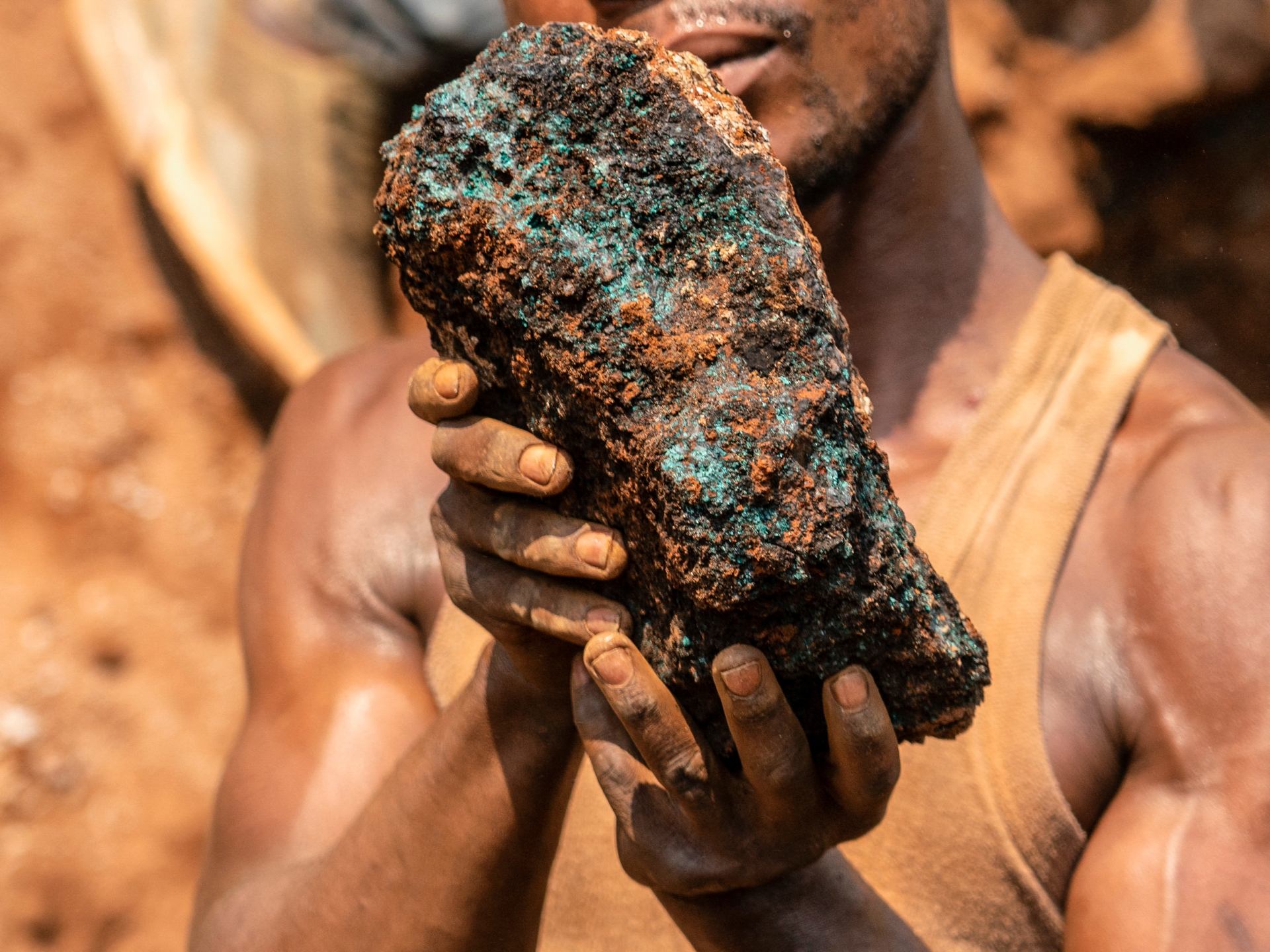At the bottom of a crater in southeastern Democratic Republic of the Congo, 5,000 diggers pack tightly together, swinging hammers and picks to prise chunks of speckled blue-gold ore from the earth.
In this scene of almost Biblical toil, the prize is cobalt – a strategic metal found in abundance in the central African nation.
But the huge pit in Shabara, about 45 kilometres (30 miles) from Kolwezi, is also a big headache.
About 20,000 people work at the mine, in shifts of 5,000 at a time. Mining operations have been ongoing for years here in flagrant violation of the DRC’s laws and in defiance of the site’s owner, a subsidiary of mining and commodities giant Glencore.
As the diggers gouge at blue-tinged soil, hundreds of dust-covered porters trudge up a ramp leading out of the pit, their backs bent under the weight of sacks of ore.
Marcel Kabamba, age 31, taking a break amid the sounds of clanging and the shouts of his fellow diggers, said he could make the equivalent of $200 on a good week – a small fortune in a country where most live on under $2 a day.
“We’re fighting to be left in peace,” he said.
‘The Wild West of mining’
According to market specialist Darton Commodities, the DRC last year produced 72 percent of the world’s cobalt, a key ingredient in rechargeable batteries in electric cars and mobile phones.
But the sector’s image is tarnished by artisanal mining, where accusations of child labour, dangerous working conditions, and corruption are rampant.
“It’s the Wild West of mining,” said one industry analyst.
Under Congolese law, artisanal diggers are only allowed to work in government-designated zones and as part of approved cooperatives.
But most diggers say the designated areas are unviable.
Many prefer to operate on industrial concessions where there are large, identified deposits, even though this can lead to a showdown with powerful multibillion-dollar corporations.
“We’re not going to give in,” said Michel Bizimungu Lungundu, the deputy of the COMAKAT, the highly organised cooperative at Shabara, arguing that locals had the right to exploit the lucrative ore.
In 2018, the DRC enacted mining reforms aimed in part at strengthening control over the roaring cobalt trade.
The country declared the metal “strategic” and hiked taxes on industrially produced cobalt.
In 2019, as a storm over rights and working conditions mounted, it also established the state-owned Enterprise Generale du Cobalt (EGC), giving it a monopoly on buying and marketing artisanally produced ore from the designated zones.
The idea was multi-pronged: develop the artisanal sector, boost standards, and profit from the trade.
“Your Teslas, Samsungs and Apples had started to balk at cobalt,” said EGC’s compliance and environment director, Tosi Mpanu Mpanu, referring to the reputational cost of buying ore from the DRC. “This was starting to create a real problem.”
Today, though, efforts to clear up the illegal mines are at near standstill.
Most diggers are refusing to move into the designated artisanal zones and EGC has yet to start buying cobalt.
“It’s a mess,” admitted a senior government official in Kolwezi, the capital of Lualaba province, who said Kinshasa had decided the zones seemingly at random.
The DRC mines ministry did not respond to questions.
‘A glaring problem’
In 2010, COMAKAT signed a deal with Shabara’s then-majority owners, Dino Steel, entitling them to keep exploiting the pit.
This deal could be renounced only if both parties agreed, according to a copy of the agreement shared with the AFP news agency.
In 2015 came a shock: news of Shabara’s sale, and with it the expectation that the diggers would leave.
Seven years on, their stubborn presence is also frustrating to Glencore, which says it cannot fully develop its concession and that the illegal mine poses a safety risk.
“It’s a glaring problem,” said Marie-Chantal Kaninda, Glencore DRC’s head of corporate affairs.
The Anglo-Swiss company is “engaging” with the government to gain access to the site, according to a spokesman, and it supports diggers moving to artisanal mining zones.
“With up to 40 trucks leaving the site to deliver ore to other companies in the region every day, it is clear that these activities are organised and are not the work of small-scale artisanal miners,” the spokesman added.
AFP was unable to reach Groupe Bazano, which owns Dino Steel.
An estimated 200,000 people work as informal cobalt diggers, making shifting them en masse a tough proposition.
“Many reforms … have gotten railroaded because of vested interests in maintaining the status quo,” said Sasha Lezhnev at an NGO called The Sentry.
Some politicians also appear to have close ties to artisanal mines. Lualaba Mining Minister Jacques Kaumba Mukumbi is the former president of COMAKAT, according to press reports. He did not respond to several AFP requests for comment.
Artisanal cobalt comprises 4-5 percent of Congolese production, according to price-reporting houses, with an output of several thousand tonnes per year.
Those figures would make the DRC one of the world’s top cobalt producers from its informal diggers alone.
Glencore’s Mutanda mine, which lies five kilometres (3 miles) away from Shabara on the same land concession, is the world’s largest cobalt mine.
But it has been closed since 2019 partly because of higher taxes and a market slump, the company says. Cobalt spot prices have fallen from about $70,000 per tonne at the start of the year to $50,000.
Despite such fluctuations, analysts say the metal’s future is strong given demand from the energy transition – and which in turn will sustain the mining frenzy.
All this means that mining firms and diggers share an interest in cleansing Congolese cobalt of its tainted image, said David Sturmes at the Fair Cobalt Alliance, a multi-stakeholder initiative.
“Conditions do not yet meet international expectations,” he said.
“But they won’t improve until we invest – and we can only invest if we solve the legalisation.”
